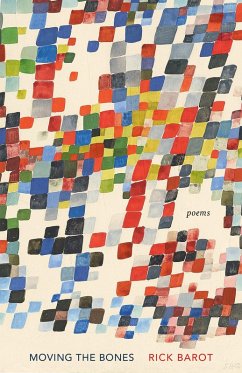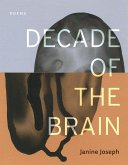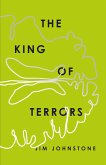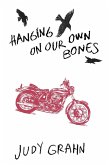A vulnerable and honest collection of poems exploring lineage, love, and the pandemic, from one of the most acclaimed poets of his generation.
You are told to believe in one paradise / and then there is the paradise you come to know, begins Rick Barot. What follows is an account of the rich and thorny valley between those poles. Moving the Bones dwells in liminal spacesof love and memory, the pandemic's singular domesticity, a serene cemetery of ancestral plots, dawn. In precise and tender verse, Barot captures the particularities of being in the middle of one's life, reflecting on the joys and sorrows of the past and confronting the inevitabilities that lie ahead.
For Barot, this presence of mind is an art of being lost in thought. My mind has a slow metabolism, it is slow / to understand what anything means, he confides, but understands that if you look at something / long enough, it will have something / to say to you. Appreciating a Rembrandt, standing in a Goodwill, watching a boy with a flower behind his earwe encounter ephemeral murmurs of meaning everywhere, but only by slowing down, listening. If we take time to notice the enduring insights of daily moments, if we praise cherry blossoms, lungs, and crying, we might find it easier to bear the loss of a loved one, the sting of solitude, the body's decline.
By laying bare his own experiences, Barot brings us close enough to witness the lyrical work of consciousness. Patient and attentive, this collection illuminates the everyday and invites us to find pleasure in doing the same, at every stage of life.
You are told to believe in one paradise / and then there is the paradise you come to know, begins Rick Barot. What follows is an account of the rich and thorny valley between those poles. Moving the Bones dwells in liminal spacesof love and memory, the pandemic's singular domesticity, a serene cemetery of ancestral plots, dawn. In precise and tender verse, Barot captures the particularities of being in the middle of one's life, reflecting on the joys and sorrows of the past and confronting the inevitabilities that lie ahead.
For Barot, this presence of mind is an art of being lost in thought. My mind has a slow metabolism, it is slow / to understand what anything means, he confides, but understands that if you look at something / long enough, it will have something / to say to you. Appreciating a Rembrandt, standing in a Goodwill, watching a boy with a flower behind his earwe encounter ephemeral murmurs of meaning everywhere, but only by slowing down, listening. If we take time to notice the enduring insights of daily moments, if we praise cherry blossoms, lungs, and crying, we might find it easier to bear the loss of a loved one, the sting of solitude, the body's decline.
By laying bare his own experiences, Barot brings us close enough to witness the lyrical work of consciousness. Patient and attentive, this collection illuminates the everyday and invites us to find pleasure in doing the same, at every stage of life.
Dieser Download kann aus rechtlichen Gründen nur mit Rechnungsadresse in A, D ausgeliefert werden.









